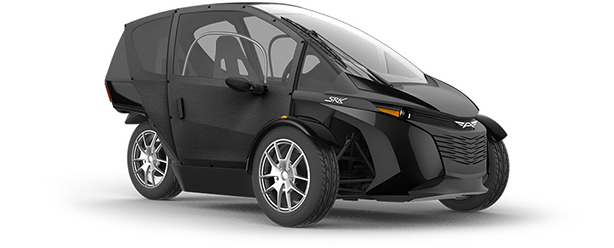
“A drivable shark.”
That’s how one early tester described the fully electric prototype vehicle built by
Arcimoto.
The driver was television actor
Jon Huertas, and his reasoning for the comment, according to Arcimoto President and founder Mark Frohnmayer: “You have such power and control on the road.”
Exciting to drive, gas-free and highly recyclable to boot? What’s not to love?
“What we’re making is going to be an incredible fun, affordable solution for your daily driving,” Frohnmayer says. “It’s the next leap beyond in terms of energy and space efficiency.”
Frohnmayer opened Arcimoto (which means “future I drive”) in
Eugene, OR, with the goal of creating a more environmentally friendly way to get around. Interestingly, the company is the product of his own frustration. He could not find a suitable electric vehicle for commuting to work or making quick trips around town — which, he points out, constitutes a high percentage of Americans’ driving habits.
Arcimoto started building its first car in 2007. The vision then was a two-seater, three-wheeled vehicle that would provide excellent drivability and a small footprint, both in terms of physical size and environmental impact.
The end result was something Frohnmayer characterizes as a cross between a motorcycle and a Jeep: a futuristic-looking vehicle with a strong safety cage onto which buyers can attach a plastic or fabric covering, depending on their needs.
The SRK, Arcimoto’s first vehicle, is expected to be available in limited quantities in 2014. General production will likely begin in 2015. With a projected cost of $17,500, it meets another of Frohnmayer’s goals: affordability.
The car has plenty of other eco-friendly features besides its gas avoidance. The frame is made of aluminum. Individual cells in the battery pack can be swapped out, which means if one cell fails the entire battery does not need to be replaced. Both the plastic and the fabric cover materials are completely recyclable.
“We’re not bonding the body to the frame, so it will be very easy to separate out the different materials for recycling,” Frohnmayer says. “We very much intend for this to be a cradle-to-grave product.”
Since the vehicle isn’t on the road yet, it is impossible to know its exact mileage. But, Frohnmayer says they’re aiming for a car that will travel 40 miles on a standard battery and up to 120 miles on an extended-life battery. Recently,
Arcimoto received $150,000 to test its battery-pack design in hopes of extending overall battery life. Currently, the vehicle is estimated to get the equivalent of 190 miles per gallon. Not bad for a landed creature of the sea.
